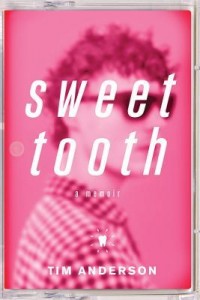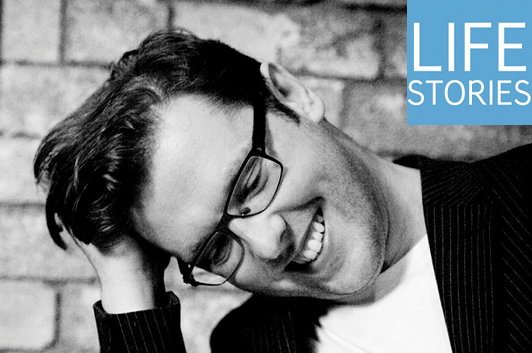Read This: Sweet Tooth
As I’m writing this post, I’ve recently finished editing a Life Stories podcast featuring Rayya Elias, which we recorded shortly after her memoir Harley Loco came out in paperback. And that reminded me that I’d had this recurring thought about how I could tell you about some earlier episodes of the podcast, and how those books were out in paperback, too, and if you hadn’t read them when they first came out, here was a good opportunity.
Well, if you look at the iTunes episode list, you’ll see the podcast has been running for just about two and a half years now, so a lot of those books are in paperback now, and it didn’t seem fair to single out some at the expense of others. So I thought, okay, have any of my early guests come up with a new memoir?
 One of my first conversations was with Tim Anderson, who’d written Tune In Tokyo about his time as a teacher of conversational English in Japan. His second memoir, Sweet Tooth, backtracks in time to his North Carolina adolescence, when he was simultaneously realizing that he was gay and developing the first symptoms of diabetes. As in his first book, Tim tells his story with an airy, self-deprecating humor that’s likely to draw you in pretty quickly—and you don’t need to have read Tune In Tokyo to follow along, so you can jump right in.
One of my first conversations was with Tim Anderson, who’d written Tune In Tokyo about his time as a teacher of conversational English in Japan. His second memoir, Sweet Tooth, backtracks in time to his North Carolina adolescence, when he was simultaneously realizing that he was gay and developing the first symptoms of diabetes. As in his first book, Tim tells his story with an airy, self-deprecating humor that’s likely to draw you in pretty quickly—and you don’t need to have read Tune In Tokyo to follow along, so you can jump right in.
6 July 2014 | read this |
Life Stories #74: Damian Barr
Subscribe to Life Stories in iTunes
On this episode of Life Stories, the podcast where I interview memoir writers about their lives and the art of writing memoir, my guest is Damian Barr, and we’re talking about Maggie & Me, his story of “coming out and coming of age in 1980s Scotland.” We discussed his complex feelings towards then-prime minister Margaret Thatcher; on the one hand, he admired her messages of individualism and achievement, yet her economic policies had a devastating effect on his family and the community in which they lived—and the government’s condemnation of homosexuality, and even of the “promoting” of homosexuality, intensified the isolation he endured as he struggled to make sense of his identity.
We also talked about the abuse that young Barr suffered at the hands of a stepfather who’d already guessed at his gayness before he himself had put a name to it, and that got us talking about whether his parents had known as well:
“I remember the first time that somebody called me a poof, and they said it with such venom… More than that, they knew, they knew something about me that I didn’t know, and that was really disturbing. And I remember thinking, what is this thing that I don’t know, and I ran into the house to my mum and said, ‘Mum, mum, mum!” What is it? ‘Jason (or whatever his name was) just called me a poof! What’s a poof?’ And she didn’t say, That’s not you, or Tell me who this Jason is, or anything else; she just said, Don’t you worry about that—it’s okay.
I think she always knew. When I did come out, she wasn’t surprised. She was upset and sad, and she tried to ground me… My dad said, It’s not true. ‘Well, it is true.’ It’s just not true. Come back to me in a few years. And I went back to him in a few years and said, ‘Still true.’
And, among other things, we talk about how Barr came to write a memoir after making attempts at fiction—and why, once he plunged into nonfiction, he decided not to visit Scotland during the writing, or draw upon his journalistic training to interview the other major figures in that time of his life.
Listen to Life Stories #74: Damian Barr (MP3 file); or download this file by right-clicking (Mac users, option-click). Or subscribe to Life Stories in iTunes, where you can catch up with earlier episodes and be alerted whenever a new one is released. (And if you are an iTunes subscriber, please consider rating and reviewing the podcast!)
1 July 2014 | life stories |


 Our Endless and Proper Work is my new book with Belt Publishing about starting (and sticking to) a productive writing practice.
Our Endless and Proper Work is my new book with Belt Publishing about starting (and sticking to) a productive writing practice. 
